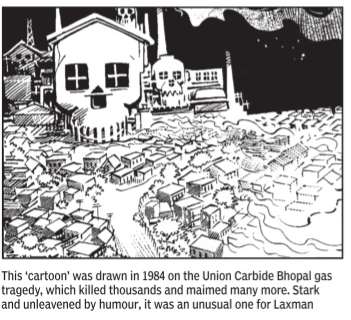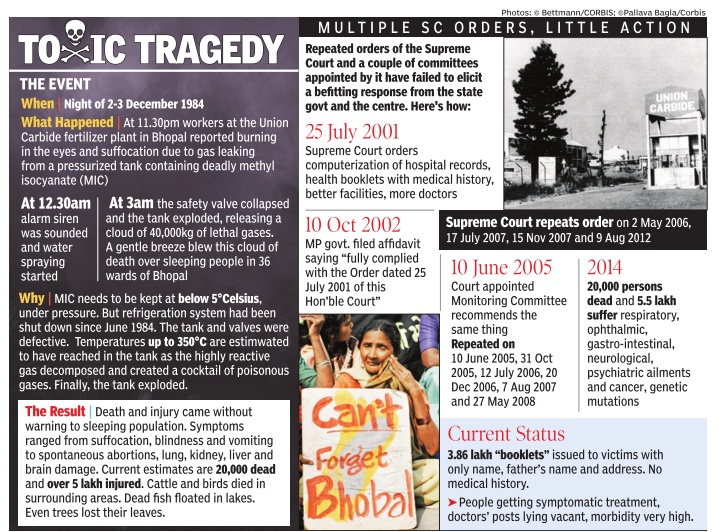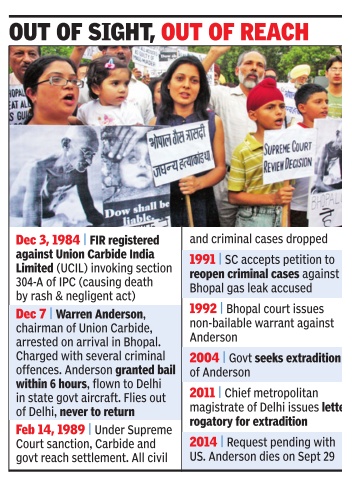Bhopal Gas Tragedy, 1984
This is a collection of articles archived for the excellence of their content. |
Lifelong medical aid
LEAK THAT GASSED A GENERATION
Subodh Varma The Times of India Dec 03 2014
MP Govt Sits On SC orders for 13 Years
After 17 years, on July 25, 2001, SC ordered that I-cards be issued to gas victims, and permanent cards given to those who need lifelong medical aid. It ordered that medical records be computerized and booklets containing medical history be given to victims.This'd ensure proper treatment to all victims. The court repeated the order on May 2, 2006, July 17, 2007, November 15, 2007 and August 9, 2012.
A court-appointed monitoring committee made the same recommendations on June 10, 2005, Oct 31, 2005, July 12, 2006, Dec 20, 2006, Aug 7, 2007 and May 27, 2008. An advisory committee said the same.
A report submitted by the monitoring panel in June 2014 says: “So far as computerization is concerned .......the same isn't satisfactory and isn't patient-centric, it doesn't appear useful in affording history of treatment of patients when they approach doctors“. This mean no medical history is available on the digital database. “Issuance of health booklets to patients is inadequate,“ the monitoring committee says. The so called booklets contain name, father's name, address, but no medical information. Thirty years after the disaster, over 5.5 lakh survivors suffer from ailments and disability and are susceptible to diseases.The Indian Council of Medical Research's recent survey of affected people says morbidity, that's prevalence of disease among gas victims, is “21.5% in severely exposed areas, 17.2% in moderately exposed and 18.1% in mildly exposed areas, higher than 8% morbidity in control areas.“
In 2012, SC noted that 80% of specialist and 30% of doctors' posts were vacant in gasrelief hospitals. Besides hampering treatment of patients, this helps unscrupulous operators peddle treatments and spurious drugs, activists say.
Why are medical records important? The main reason is that survivors getting sympto matic and palliative treatment across hospitals and outreach centres are shunted from one place to another. Doctors don't know the medical history and only superficial treatment is given, activists say .
Another issue linked to the health booklets and digitization is that it'd clearly identify the nature of disability suffered by each victim and determine their numbers. This'd be essential for further compensation payments, as are expected, and as the Centre has sought in a 2010 petition in SC. This curative petition seeks to amend the 1986 SC-supervised settlement between the Centre and Union Carbide that led to a paltry compensation. The story of this petition is another of those legal riddles that forms part of the Bhopal bhool-bhullaiya. Even after filing of the petition four years ago, not one hearing has been held. Dates are fixed and cancelled. Sometimes months pass by with no date fixed, says N D Jaiprakash, an activist involved in Bhopal cases for the three decades.
Relief measures
Gaps remain even after 32 years/ 2016
For the 5.5 lakh survivors of the Bhopal gas disaster, the 32nd anniversary today brings small relief from their twin struggles against disability and in the search for justice.
Although health facilities are better, the state government has still not issued health cards and full medical histories despite Supreme Court orders. So, symptomatic treatment is still what they get. And, this leads to them being categorised as having `temporary' disability although it is the 32nd year of recorded treatment.As a result, the central government too is seeking more compensation for them just for temporary disabilities. Meanwhile, all their hopes are pinned on various court cases, winding their way through the legal maze, from Bhopal to Delhi.
The disaster happened when a deadly cocktail of poisonous gases exploded out of a Union carbide owned fertilizer factory on the night of December 23, 1984. The gas cloud spread over the sleeping city causing choking, burning, and a painful death to many while survivors are debilitated with weak lungs, eye problems, and a host of other gastrointestinal, neurological, genetic and psychiatric issues.
In 1998, survivors' organisations approached the SC for better healthcare to those suffering. In 2012, the court ordered the state and central governments to computerize all patient histories, issue health cards, standardize protocols of treatment and restart research on the condition of patients. Over four years have passed since that order but there's not much progress, says N D Jayaprakash, who has been fighting for the victims' rights.
“Even 32 years after the disaster, most of the gas-victims seeking treatment continue to be classed as suffering from temporary injury to deny them compensation for permanent injury ,“ Jayaprakash said.
The compensation for the world's worst industrial disaster was fixed at a meagre Rs 705 cr in 1989 by the apex court. Twenty one years of protests and advocacy forced the government to file a curative petition in 2010 seeking enhancement of the compensation amount to Rs 7,728 cr. The primary reason was that the earlier deal had underestimated the number of victims. As it turned out, over 20,000 persons have died due to direct consequences of the killer gas and another 5.5 lakh are suffering.
But not a single hearing has taken place on the curative petition in six years. The central government doesn't seem interested and the court has been giving continuations.The criminal case against the Union carbide (taken over by Dow Chemical in 2001) and their Indian partners continues to languish.





